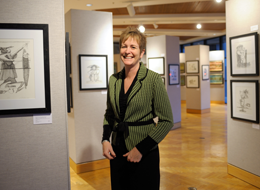Roxanne Mountford Treats Students As Researchers
By Robin Roenker
photos by Lee Thomas
Roxanne Mountford didn’t know the study of rhetoric and composition existed as a field when she decided to pursue a graduate degree in English at The Ohio State University in the mid-1980s. But the moment she began to teach her first composition class as a graduate assistant, she knew she’d found her calling.
“I fell in love with the teaching of writing. I knew immediately that’s what I wanted to spend my whole life doing,” said Mountford, who received her doctorate in 1991 focusing on the history, theory and practice of rhetoric and composition.
 Mountford joined UK’s faculty as Associate Professor in Rhetoric and Composition in 2008 after 12 years on the faculty with the University of Arizona’s rhetoric and composition program. Next year, she will take on directorship of UK’s Writing Program, an opportunity that drew her to Lexington.
Mountford joined UK’s faculty as Associate Professor in Rhetoric and Composition in 2008 after 12 years on the faculty with the University of Arizona’s rhetoric and composition program. Next year, she will take on directorship of UK’s Writing Program, an opportunity that drew her to Lexington.
“The thing that’s really fantastic about UK’s Writing Program is its focus on teaching engaged citizenship to students,” Mountford said. “That is one of my deepest goals—this idea that students can be engaged in making the world a better place.” As Writing Program director, Mountford hopes to “focus her energy and attention on deepening that theme,” she said.
At the University of Arizona, she engaged undergraduate students in gathering oral histories of the region and then making those histories available to a wide audience online. This project resulted in a much-visited and lauded university Web site featuring archived profiles of people and places in Tucson. She is asking her English 401 students to gather community stories of Kentucky.
“My teaching philosophy is that students should have the opportunity to participate along with faculty in the basic research mission of a university,” Mountford said. “It’s been my belief for some time that when we treat students as if they are the researchers they really are, then some really extraordinary things can happen inside the classroom.”
Mountford plans next spring to introduce a new upper division rhetoric course for undergraduate English majors at UK, so that—unlike her—they will have an opportunity to be exposed to the field before graduate school. She also hopes to establish a certificate program or a master’s level focus area in rhetoric and composition for UK’s graduate students.
Mountford’s own scholarship focuses on rhetoric, a field that, she says, combines her lifelong interests in politics, women’s issues, and themes of justice and equality with her passion for writing and reading.
“Studying rhetoric has allowed me to study what’s going on around me in the world a little more directly,” said Mountford, an Ohio native who completed her undergraduate degree at Malone College in Canton, Ohio.
Her recently released “Women’s Ways of Making It . . . In Rhetoric and Composition,” written with Michelle Ballif and Diane Davis, compares and contrasts the career paths and professional choices of nine prominent women in the field of rhetoric and composition.
Her earlier work, “The Gendered Pulpit: Preaching in American Protestant Spaces,” published in 2003, analyzes how women ministers’ shift away from use of the pulpit changed the dynamics of space and tradition within their churches, allowing them to achieve authority in a field that had been male-dominated.
Issues of gendered performance and how ministers go about attaining a sense of authenticity in their rhetorical approach is a question Mountford hopes to continue exploring. Her next book focuses on famous early 20th-century evangelist Aimee Semple McPherson.
“She had so much trouble establishing her authenticity with the press. They didn’t think she was authentic. But authenticity is very difficult from a rhetorical standpoint,” Mountford said. “Day in and day out, we all have to play different roles, effect different stances, some would argue, become different people. That’s especially true for a preacher, who has to assume a persona when she preaches. So you’re left with the question: what does it mean to be authentic?”
As much as she loves her research, Mountford says she’ll never give up teaching. “All those things I love about doing ethnographic research and about reading, all those things show up in a writing classroom,” she said. “After all these years, I sill love it. My students are always making connections that I find original and fascinating.”
